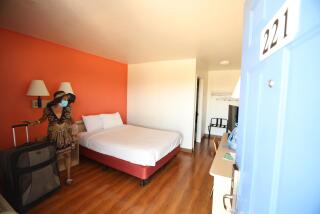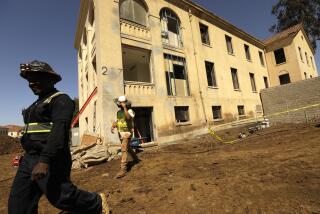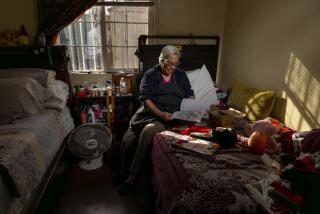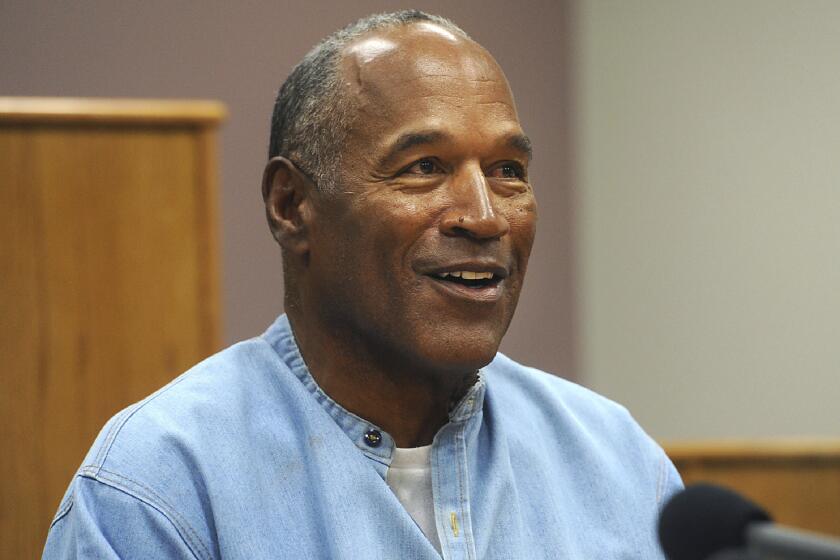Lawmakers frustrated by lack of progress on veterans home
When Assembly member Sharon Quirk-Silva read here last Sunday that it could take two more years to build a kitchen in the half-empty West Los Angeles Veterans Home, she called outgoing Assembly Speaker John Pérez at home.
“Let’s see what we can do to speed up this process,” Quirk-Silva (D-Fullerton), head of the Assembly Veterans Affairs Committee, said to Pérez.
Pérez, the outgoing Assembly speaker, was on board with that.
“I think I speak for all my colleagues in both parties in saying we’re incredibly frustrated by the delays,” Pérez told me.
In one of the more incredible bureaucratic debacles in recent memory, the CalVet home that opened in 2010 still has about 200 empty beds. This is despite long waiting lists and shocking numbers of homeless veterans in Greater Los Angeles. Without a new kitchen, CalVet officials say, it can’t fill the rest of those beds with elderly vets who need skilled nursing and residential care for maladies such as memory loss.
Pérez and Quirk-Silva are particularly peeved by CalVet’s snail’s pace because the Legislature freed up $770,000 this summer and told the department to get moving on the kitchen project. But CalVet does not appear to have gotten the message. A spokesman for the department told me bidding for construction of the kitchen won’t take place until spring of 2015, with completion expected by early 2016.
It’s like an episode of “The Twilight Zone.” In what universe does it take longer than two weeks to do the bidding and a few months to fire up the ovens?
“We expect better, and we demand to see better results,” Pérez said. “The money’s there. The question is whether the leadership is there.”
Pérez said his frustration with CalVet is one reason he’s circled around the department to address the needs of veterans in other ways. Pérez sponsored Proposition 41, which voters approved in June, to offer assistance to local government, nonprofits and private developers in preventing homelessness and providing housing.
And he’s not alone among public officials who are fed up with the West Los Angeles Veterans Home that set taxpayers back $253 million.
Congressman Henry Waxman and Sen. Dianne Feinstein called last week for the secretaries of the federal and state Veterans Affairs departments to “begin immediate discussions ... to cut through the bureaucracy and put an end to this sorry saga. Every bed should be filled as soon as possible.”
OK, but meetings have been going on for years among staff members representing Waxman, Supervisor Zev Yaroslavsky and others, including Toni Reinis, former director of the New Directions residential recovery program near the Veterans home.
“This department has been so dysfunctional for so many years,” said Reinis, who added that the entire problem could have been avoided. She said the state originally accepted her offer for New Directions to provide food services, but backed out to allow the federal VA to handle the job.
But that deal then fell through for reasons no one can coherently explain to me, and a planned basement kitchen was never built. Another kitchen is operating in the home, but it’s not big enough to handle more than 200 residents.
“It’s like building half a bridge,” Yaroslavsky said. “The sad thing is that within walking distance of the home, there are dozens if not hundreds of people, many of them veterans, that are sleeping on the street.”
Yaroslavsky and others did manage to get CalVet to fill some of its empty beds with formerly homeless vets in need of transitional housing. But the homeless veteran count is in the thousands.
One longtime resident gave me a brief tour of the CalVet facility this week, and that drove home how heartbreaking the whole thing is. The home is comfortable, safe, nicely furnished, warm and inviting — the kind of place you would want for those in need who served their country.
“It’s a magnificent facility and...these are not hard problems to fix,” said David Cohen, a resident and chaplain I later spoke to by phone. “All 200 of us [current residents] are frustrated by it and we talk about it all the time, breakfast, lunch and dinner.... It’s incredibly beautiful and the place is half-empty.”
Cohen said he believes that a lack of funding has been primarily responsible for many of the home’s problems. Others agree that money has been an issue, but they put more blame on the CalVet administration.
“It’s a Sacramento problem,” said one former CalVet official who described a slothful bureaucracy in which questionable personnel moves sink morale and halt progress.
Next week, Sacramento will be sending the third director in four years to run the West Los Angeles home. At this point, the empty beds might be filled a lot faster if the state gave the director’s job to a good kitchen contractor, or maybe someone from Home Depot.
Meanwhile, I’m determined to get to the bottom of how and why the federal government backed out on the agreement to provide food service, as the state claims. And I’m told by a CalVet spokesman that I will be finally be able to discuss these and other matters this week with department brass. I’ve been trying to get good answers for two weeks, so I hope it finally happens.
Quirk-Silva told me Friday that she is working the phones trying to speed up the kitchen project. A completion date of 2016 is unacceptable, she said.
“We have to do everything we can,” she said, including an emergency licensing waiver, as I suggested in my last column.
Maybe it’s time to tell CalVet Secretary Peter James Gravett and his senior staff to just get it done.
Or else.
More to Read
Start your day right
Sign up for Essential California for news, features and recommendations from the L.A. Times and beyond in your inbox six days a week.
You may occasionally receive promotional content from the Los Angeles Times.







